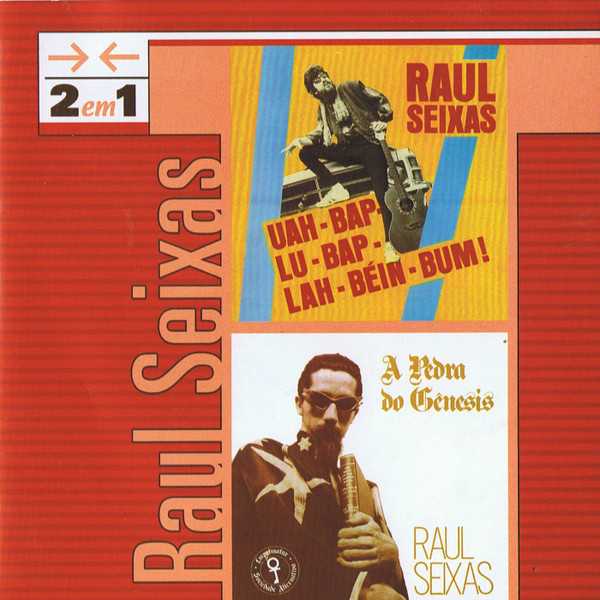MusiQ
Raul Seixas - 2 Em 1
Table of Contents
Download
Filename: raul-seixas-2-em-1.rar- MP3 size: 133 mb
- FLAC size: 716.3 mb
Tracks
| Track | Duration | Preview |
|---|---|---|
| Fazendo O Que O Diabo Gosta | ||
| A Pedra Do Gênesis | ||
| Check-Up | ||
| Cowboy Fora Da Lei | ||
| Cambalache (Cambalache) | ||
| Paranóia II (Baby Baby Baby) | ||
| Não Quero Mais Andar Na Contramão (No No Song) | ||
| I Don't Really Need You Anymore | ||
| Abertura / Quando Acabar O Maluco Sou Eu | ||
| Gente | ||
| Areia Da Ampulheta | ||
| Loba | ||
| Cantar | ||
| Senhora Dona Persona (Pesadelo Mitológico Nº3) | ||
| Lua Bonita | ||
| I'm (Gita) | ||
| A Lei | ||
| Canceriano Sem Lar (Clínica Tobia Blues) | ||
| Cavalos Calados |
Images

Catalog Numbers
583475 2Labels
EMIListen online
- kuunnella verkossa
- lytte på nettet
- ouvir online
- online anhören
- ascolta in linea
- online luisteren
- escuchar en línea
- lyssna på nätet
- écouter en ligne
Formats
- CD
- Compilation
Companies
| Role | Company |
|---|---|
| Manufactured By | Videolar S.A. |
| Manufactured For | EMI Music Brasil Ltda. |
Barcodes
Barcode: 7 24358 34752 4About Raul Seixas






Brazilian singer and songwriter, born June 28, 1945 Salvador, BA, died August 21, 1989 in São Paulo, SP. He is frequently called as the "Father of Brazilian Rock" and the "Mad Beauty / Maluco Beleza".
Raul Seixas began his career in the 1960s using the nickname as a member and leader of the group The Panthers, renamed in 1964. The group recorded a single album for Odeon in 1967 at the invitation of friend Jerry Adriani, with little expressive sales. In 1969, he started working at CBS in Rio De Janeiro, already signing as Raul Seixas as producer and artistic director. He released in 1971 with his counter-culture mates the , in 1973 the under pseudonym and still in 1973 his first solo album,
His musical work is composed of 21 albums, released in a 26-year career and his musical style traveled between Rock 'N' Roll, Folk/Country Rock and Ballads of protest and love.
Raul Seixas is frequently associated with "mystical" issues due to the ideals that vindicated, as Alternative Society presented in Gitâ (1974), influenced by figures such as . Raul was interested in philosophy (especially metaphysics and ontology), psychology, history, literature and latin language, and some of these beliefs currents were much enjoyed in his work, which had a good or curiosity reception on that account. He managed to enjoy a relatively high audience during his lifetime, and even in the 1980's continued to produce albums that sold well, as Uah-Bap-Lu-Bap-Lah-Béin-Bum! (1987) and A Panela Do Diabo (1989), the latter in partnership with . As with so many idols who died prematurely, the search and release of material is intense and has sold very well over the last ~35 years, as well as the re-releases of his works in life.
In October 2008, Rolling Stone Brazil promoted the list of the 100 Greatest Artists of Brazilian Music, whose results put Raul Seixas ranks the 19th position, heading names like , , . In the previous year, the same magazine promoted the list of the hundred biggest albums of Brazilian music, where his 1973's "Krig-Ha Bandolo" reached the 12th position, demonstrating that the Raul Seixas is still considered a major force of Brazilian rock music.
Guidance: Releases which mention Raul Seixas or parts of it with abbreviations or nicknames are filed here. Releases which mention his nickname itself, without references to "Raul" or "Seixas" are filed under .
Real Name
- Raul Santos Seixas
Name Vars
- R. Seixas
- Raul
- Raul Santos Seixas
- Raul Seixa
- Raul Sexas
- Raulzito
- Raulzito Seixas
- Raúl Seixas
- Seixas
Aliases
- Raulzito
- Rock Generation
